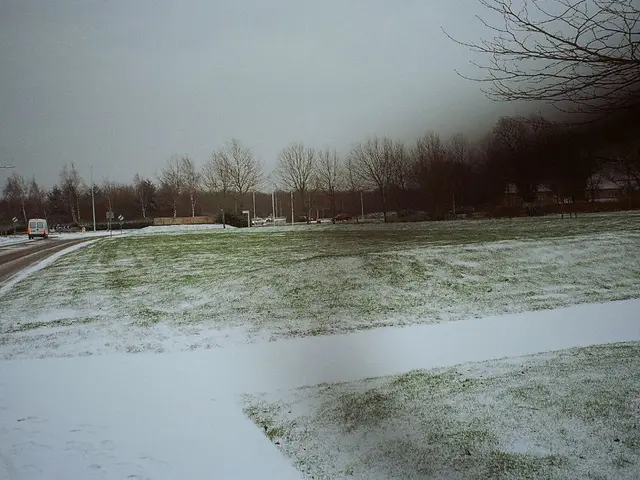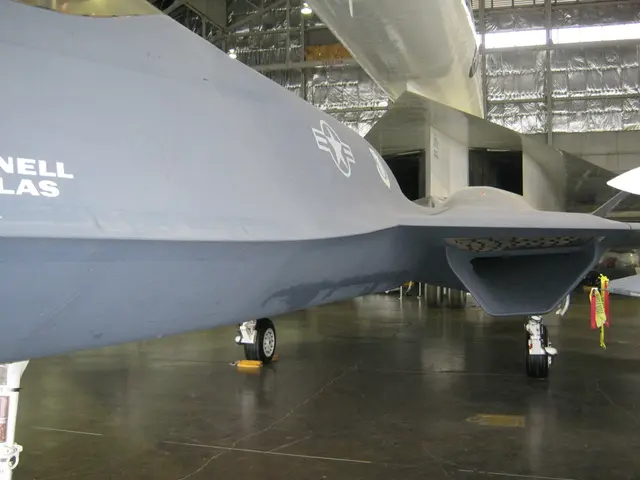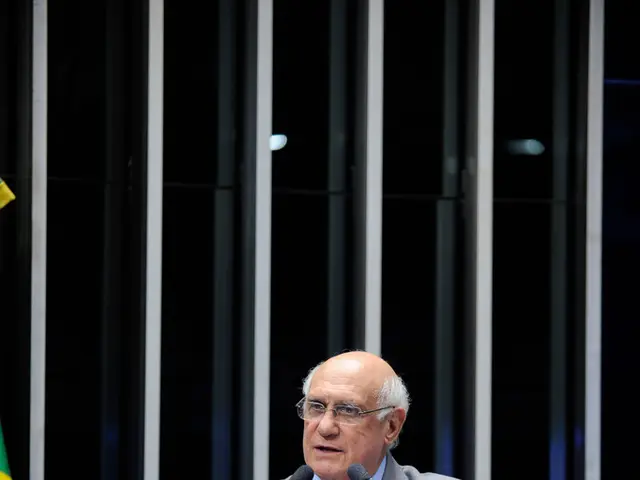Europe: A Tapestry of Celebrations, Remembrance, and Concern
Europe's observance of the 80th anniversary of Nazi capitulation during World War II
In the heart of Europe, the echoes of World War II still resonate, as 80 years have passed since Nazi Germany's unconditional surrender was accepted. This significant event, known as Victory in Europe Day, marked the end of the conflict in Europe, preceding Japan's surrender by nearly four months on Sept. 2, 1945.
The continent honors this historical milestone with memorials, moments of silence, and festivities, even as it grapples with worries about its future security. Tensions persist amid Russia's ongoing war in Ukraine and deteriorating relations with the United States.
What Happens Now in Europe?
In Great Britain, a series of commemorative events unfolded this week, starting with a military parade on Monday. King Charles III saluted the assembled troops, including soldiers from Ukraine. The royals and politicians attended the parade alongside WWII veterans, many using mobility aids. In a speech at a defense conference, Prime Minister Keir Starmer hailed the "greatest victory in the history of this great nation."
Thursday brings a service at Westminster Abbey, a nationwide moment of silence, and an evening concert at the Palace of Westminster. Streetside tea parties and extended pub hours are popular throughout neighborhoods, as people pay tribute to the "greatest generation."
Paris offers a wreath-laying ceremony in front of a Gen. de Gaulle statue, while Germany commemorations take on a more solemn tone, focusing on the horrors of fascism.
Germany's Mixed Emotions
Although May 8 is celebrated as a day of liberation in Germany, the concept has drawn renewed scrutiny. German historian Katja Hoyer, author of Beyond the Wall, argues that the term "liberation" may lessen the responsibility of ordinary Germans, implying they were unwillingly held captive by their own Nazi regime rather than actively supporting it. Germans are still grappling with how to assume accountability for their ancestors' actions and the devastating impact of millions of WWII victims.
On this anniversary day, Foreign Minister Johann Wadephul stated, "The historic responsibility for this betrayal of civilization and the memory of the millions of victims of the Second World War unleashed by Nazi Germany make it our responsibility to resolutely defend peace and freedom in Europe today."
Looming Challenges for Europe
Five years ago, the 75th anniversary of V-E Day exhibited a celebratory atmosphere, albeit within the context of a COVID lockdown. But this year's 80th anniversary evokes a sense of trepidation, fear, and uncertainty. According to British historian Timothy Garton Ash, author of Homelands, A Personal History of Europe, the conflict in Ukraine, the rise of non-Western global powers, and the former U.S. administration of President Trump represent unprecedented challenges for Europe.
"The war in Ukraine is by far the largest war in Europe since 1945," Garton Ash notes. "We have also discovered that countries like China and India and Turkey and other great middle powers are quite happy to go on doing business with Russia even while it's waging this war." This state of affairs highlights Europe's urgent need to reform its defense infrastructure and preparedness in the face of direct military threats from Russia.
With Trump in the White House, Europeans felt they could no longer rely on traditional U.S. security guarantees, signifying a seismic shift in transatlantic dynamics.
Copyright 2025 NPR
Enrichment Data:
Europe's evolving security landscape witnesses a complex interplay of Russian aggression, deteriorating transatlantic ties, and shifting global power dynamics, compelling Europe to reassess and adapt its defense and strategic policies comprehensively.
Impact of the Russia-Ukraine Conflict
The ongoing Russia-Ukraine war has exacerbated European security concerns, exposing critical gaps in conventional and nuclear defense, prompting NATO to accelerate its defense posture adaptations, especially air and missile defense capabilities along its eastern borders. Strangthening Europe’s defense infrastructure and readiness is essential to counter direct military threats from Russia.
Fraying Relations with the United States and Transatlantic Dynamics
Despite the continued U.S. commitment to NATO, pressure from Washington for European allies to shoulder a greater conventional defense burden compels Europe towards increased autonomy in defense capabilities while still relying on credible U.S. nuclear deterrence assurances. However, clarity on U.S. nuclear commitments is essential for Europe to confidently expand its conventional defense ownership. The emerging U.S. posture suggests a partnership where Europe assumes a more proactive and self-reliant role in regional security.
Towards European Strategic Autonomy and Defense Adaptation
Europe finds itself in a precarious situation, caught between the "Russian hammer" and the "U.S. anvil," leading it to reassess its security strategy. The survival and future effectiveness of NATO depend on Europe’s ability to adapt – both politically and militarily – to evolving security realities. Some discussions now include the possibility of EU militarization or the establishment of new European defense frameworks to reduce dependency and increase resilience.
EU Enlargement and Collective Security
Strengthening collective security through EU enlargement is critical. Integrating Ukraine, Moldova, and Western Balkan countries into the EU serves to stabilize eastern borders, reinforce regional security, and consolidate Europe’s global position. This enlargement process is now a strategic necessity closely linked to Europe’s security and resilience, requiring strong political will from EU member states.
Digital and Hybrid Security Dimensions
In addition to conventional military threats, Europe fortifies its digital security posture to address vulnerabilities exploited by hybrid and cyber threats. Initiatives such as the European Commission’s launch of a European vulnerability database signal a recognition that security now transcends traditional domains, extending to technology.
Summary
- Europe's security environment is fraught with uncertainty due to Russia's aggressive war in Ukraine and broader Eurasian geopolitical competition.
- NATO remains central but is evolving; Europe is urged to assume more conventional defense responsibilities while seeking clarified U.S. nuclear guarantees.
- The uncertain future of U.S.-Europe relations necessitates Europe to consider increased strategic autonomy, including potential EU militarization or new defense arrangements.
- EU enlargement with eastern neighbors is essential for stabilizing borders and enhancing security against external threats.
- Digital security measures are being reinforced to counter hybrid threats, complementing conventional defense improvements.
Europe stands at a critical juncture, navigating between traditional alliances and the necessity for a more autonomous, unified, and multidimensional security architecture in response to a shifting global order and persistent regional threats.
The government of Europe is currently grappling with the political implications of ongoing war-and-conflicts, such as the war in Ukraine, which has exacerbated security concerns and necessitated a reassessment of defense infrastructure and preparedness. These concerns are compounded by the fraying relations between Europe and the United States, leading to discussions about European strategic autonomy and potential EU militarization.
In the midst of these challenging times, the general-news of Victory in Europe Day serves as a reminder of past conflicts and the continents' shared history. The celebration and commemoration of this historical milestone are taking place amidst worries about future security in Europe, underlining the complex interplay between celebrations, remembrance, and concern that characterizes the continent today.






